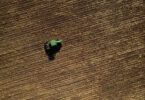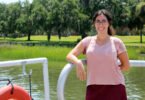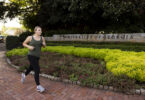Michael Chamberlain, a professor in the Warnell School of Forestry and Natural Resources, incorporates examples from his research into his teaching so that students can see how the course material applies to their lives and career paths.
When did you come to UGA and what brought you here?
I came to UGA in 2011 to join the faculty of the Warnell School of Forestry and Natural Resources. At the time, I was a faculty member at another institution and was maintaining a very successful research and teaching program. However, the opportunity to join such a well-known and respected program was appealing, as my research and teaching interests aligned well with other faculty in the Warnell School.
What are your favorite courses and why?
My “Techniques in Wildlife Management” course is my favorite for two reasons. One, all wildlife science majors are required to take the course, so it exposes me to the entire body of students majoring in wildlife sciences and affords me the opportunity to positively impact their lives and tenure at UGA. Two, for most students this course is the first where they discuss topics such as animal capture, estimating abundance or describing wildlife behavior. As such, many students flourish in this course, and I often have students tell me that this course made them recognize that they chose the right major. It’s encouraging and humbling to know that this course is impactful to students.
How do you describe the scope and impact of your research or scholarship to people outside of your field?
In a broad sense, my research is focused on better understanding relationships between wildlife species and their environment. More specifically, much of my research is directed at improving our understanding of why animals exhibit certain behaviors, and how managers can use that information to better manage landscapes for wildlife species. As such, I find that many people can relate to my work because they appreciate the outdoors and the environment. My research background is broad, but I’ve conducted applied research on wildlife species—such as large predators, game species and endangered species—that generate considerable interest from people of diverse backgrounds.
How does your research or scholarship inspire your teaching, and vice versa?
I integrate my research directly into my teaching, as the course material I teach is the foundation for much of my own work. Students learn more effectively when they can easily see that the course material is applicable to their lives and career paths. So, I frequently use examples from my research to demonstrate the effectiveness and appropriateness of particular techniques discussed in class, such as estimating animal abundance or capturing animals for research. In the end, my goal is to have students fully recognize that the course material is relevant to them, which incentivizes them to master it.
What do you hope students gain from their classroom experience with you?
I work diligently to introduce my own practical experiences into the classroom so that students can not only be taught how to do things, but see real-world examples of what I teach. I hope that students gain inspiration and excitement for wildlife research and management through their experiences in my classes. I encourage students to think critically and to always seek ways of improving as academics and people.
The one UGA experience I will always remember will be …
I’ve had many positive experiences since coming to UGA, and it’s difficult to single one out. The one experience, that gets repeated often, is watching my graduate students or undergraduates who have worked closely with me end up in career-track positions elsewhere. Ultimately, I share in the satisfaction of watching students fulfill their dreams of working in the wildlife and natural resources profession. Seeing students I’ve mentored be successful and contribute to the profession are the experiences that drive me as a faculty member.







